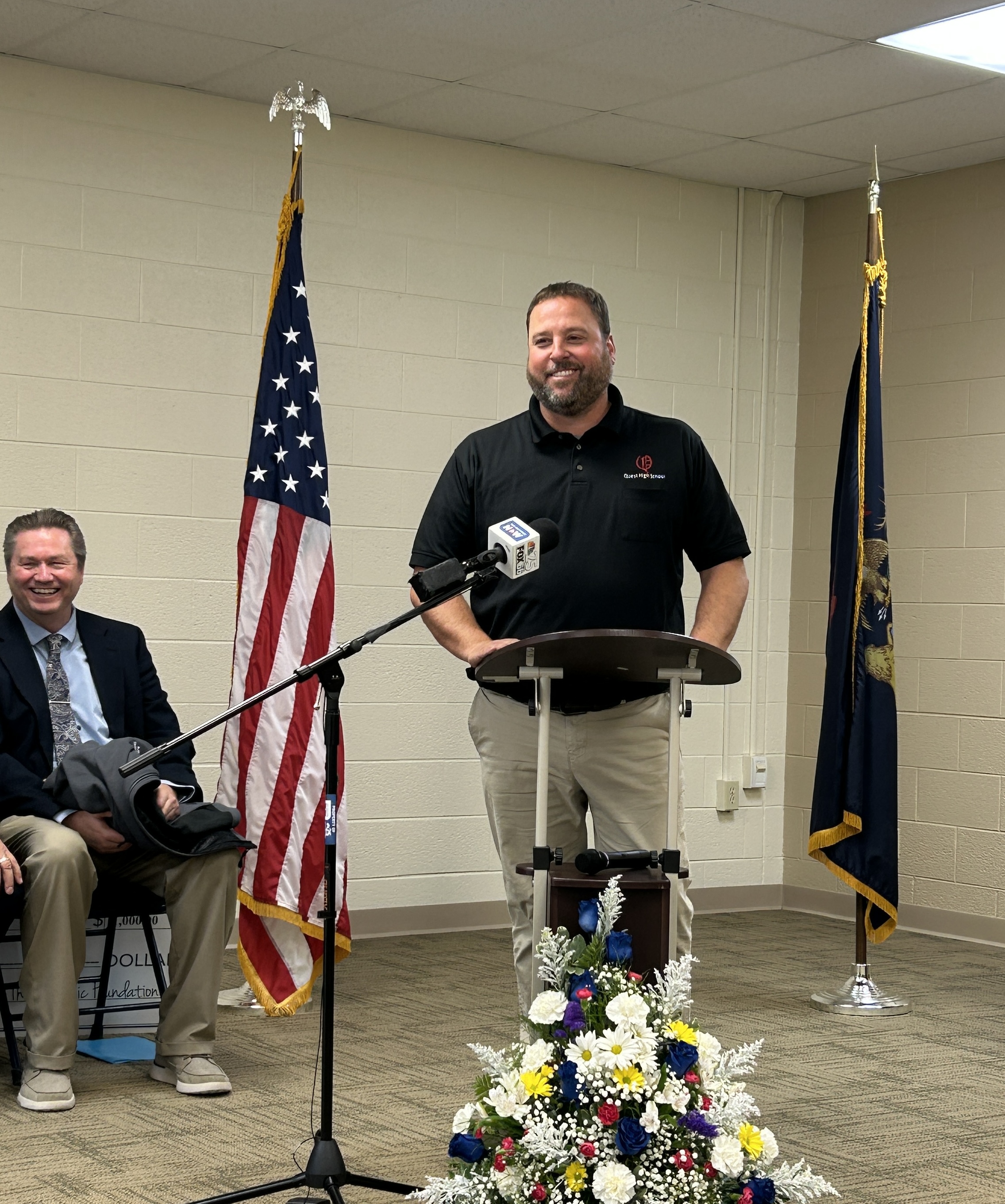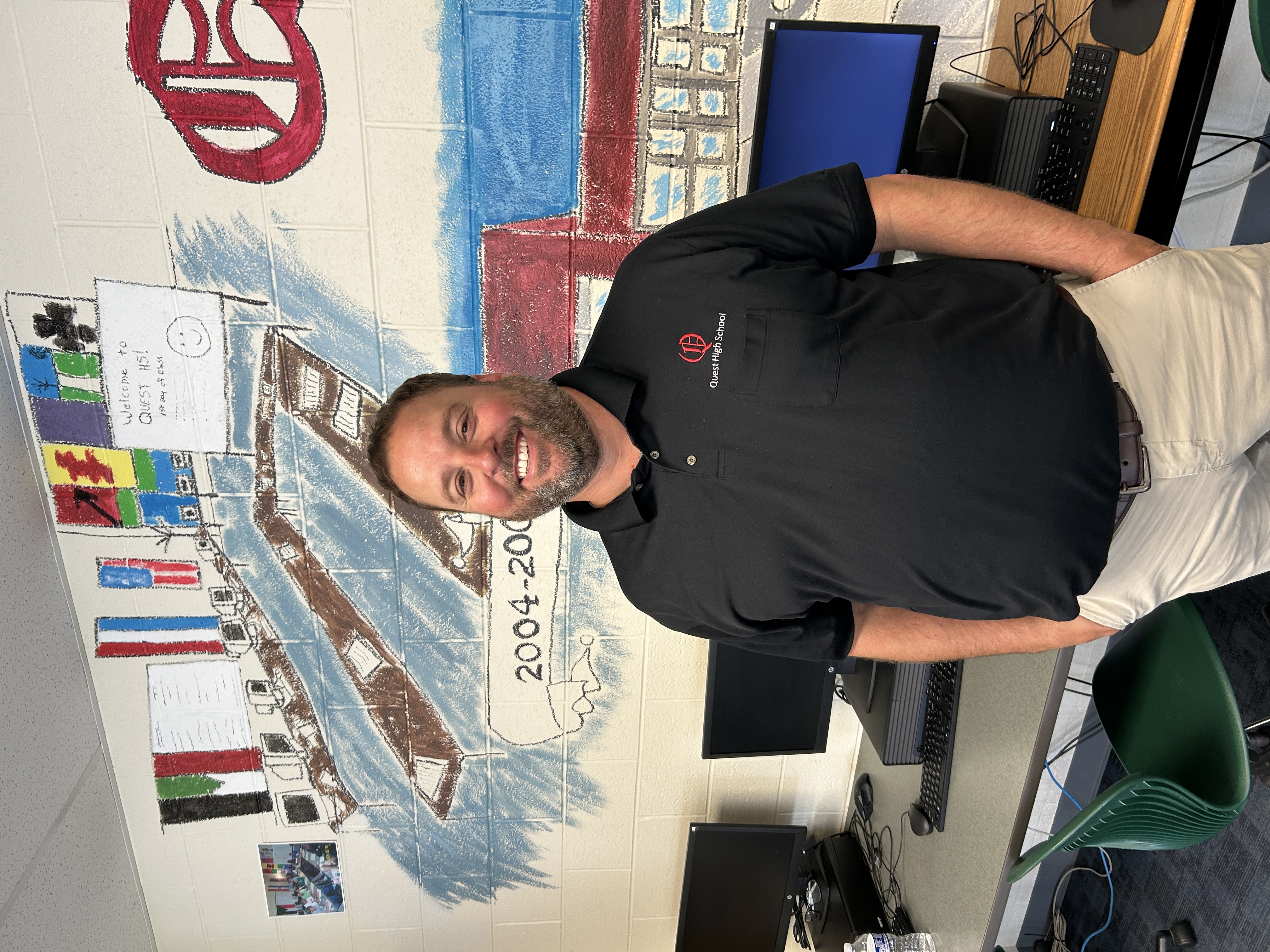Alternative educator is new Michigan Teacher of the Year
By Brenda Ortega
MEA Voice Editor

When MEA member Corey Rosser first sought a teaching job after college 20 years ago, the landscape was competitive and his only offer came from a school that didn’t fit the dream he’d once imagined.
“I was going to teach AP (Advanced Placement) classes and coach varsity basketball and win like 100 district championships, and they were going to build a statue of me outside a gym somewhere,” he quipped.
Rosser accepted the position as behavior specialist in a brand new alternative education program in Genesee County’s rural North Branch Area Schools — housed back then in a former supply closet at the high school.
The next year he became one of two teachers in the program, but he admits his early performance wouldn’t earn him any honorary statues: “Honestly, I wasn’t good at it. I didn’t think I was going to stay in alternative ed; I didn’t understand it.”
Today Rosser not only remains as a teacher at Quest High School, he’s served as program coordinator for more than a decade. What helped him stay were mentors he credits by name who modeled what works with students who struggle to succeed in traditional school settings.
“Once I shifted from a mentality of ‘They made decisions that put them in this spot,’ to ‘Here’s where we are; move forward,’ that changed my whole relationship with students. But I had people model that to me every day. Without them I probably wouldn’t have lasted in education at all.”
Now he will be a model for others. In May, at a surprise ceremony attended by Quest students, Rosser was named the 2025-26 Michigan Teacher of the Year by the Michigan Department of Education (MDE).
In a short acceptance speech, Rosser thanked colleagues, school administrators and board members for their strong commitment to keeping an alternative high school within the district. Quest is now housed in its own building, a former elementary school.
“I really do mean it,” he said afterward. “I don’t know if people think I’m giving them lip service, but there’s no alternative in Michigan that’s supported as well as we are.”
Having a dedicated building allowed Quest to develop its own identity, which has been a big part of its success, Rosser said. The school has its own mascot, school colors, traditions such as Homecoming — and even a sports league made up of alternative schools.
“We’re very blessed to have the strong support of our community, and that’s really what it’s all about is connecting kids to the community.”
Rosser also credited the nearly 600 young people who’ve attended the alternative school over the past 20 years for making it into “a special place to learn and a special place to teach.”
He’s learned the most from students, he said: “Like any young adult, they just want respect. They want to be noticed and acknowledged, and they want the good things they do to stand out.”
Not every school district has an alternative school, yet North Branch has maintained or increased support through enrollment dips and competition from lesser-quality online schools, Rosser said.
High-quality alternative schools bring opportunity for students and communities alike, he points out. Not only do alternative programs increase graduation rates for at-risk students by 16%, but young people served by them often stay local and choose careers in skilled trades.
“They’re the ones you’re most likely to see running a concrete company or a roofing company in your town a few years down the road, so it’s hugely valuable to invest in them,” Rosser said.
When his son broke an arm two years ago, Rosser took him to the hospital and encountered a former student of his working as a nurse in the emergency room. Getting his car serviced, he might find a Quest graduate is the mechanic.

One of his favorite parts of teaching there is welcoming back Quest alumni to share experiences and advice for current students.
“A lot of times you’ll see someone who’s skeptical of alternative ed until their child or niece or nephew ends up needing it for any one of a hundred reasons, and in that way they see the value in it. You literally see the value everywhere you look in the community.”
Principal Doug Lindsay said Rosser is deeply involved in the school and district, going without a planning period to serve as program coordinator and coaching basketball and baseball in addition to his role as the local union’s chief negotiator.
“The success of Corey’s students is a testament to the relationships he has with them,” Lindsay said. “His approach of truly getting to know them on an individual basis, understanding their goals and the challenges they have faced, is crucial to the program.”
MEA member Dave Scalf, who splits Quest teaching duties with Rosser and a half-time special education teacher, describes Rosser as “selfless.”
“He never comments on the hours he puts in or how many times he’s put Quest first,” Scalf said. “Even when he won the award (for Regional Teacher of the Year), he phrased it to the students as ‘Look at this cool opportunity that Quest has earned.’”
The school had 42 students last year. What makes it special, according to Scalf: “It’s a clean slate, a fresh start. For whatever reason, when our kids come here, whatever baggage they have, they’re able to leave it behind them and start over.
“None of our kids are judged about things they did before. They’ve got a chance to reinvent themselves, and it’s not lost on them. They see the opportunity, and they seize it.”
Junior Nicholas Kloss echoed Scalf’s sentiments. Kloss said he was failing nearly every class before switching to Quest, where he is now an all-A student and credits one-on-one attention and listening from Rosser for helping to build his confidence.
“He’s always there,” Kloss said. “I get more time if I need him to walk me through something, and then having the smaller classes helps me because I can get all anxious around a bunch of people. I know I can trust him — he makes me feel smart, and that lets me do better.”
In his turn as Michigan Teacher of the Year, Rosser plans to promote the importance and best practices of alternative education with the help of Scalf, his co-teacher. The two make a great team by filling each other’s gaps, he said.
“If we can help others by sharing out how we make a difference with students that are at-risk, then that’s what we want to do.”
Rosser has never taught anywhere else, and “There has never been a day that Quest has existed that I haven’t worked here. I can’t even imagine doing something else.”



